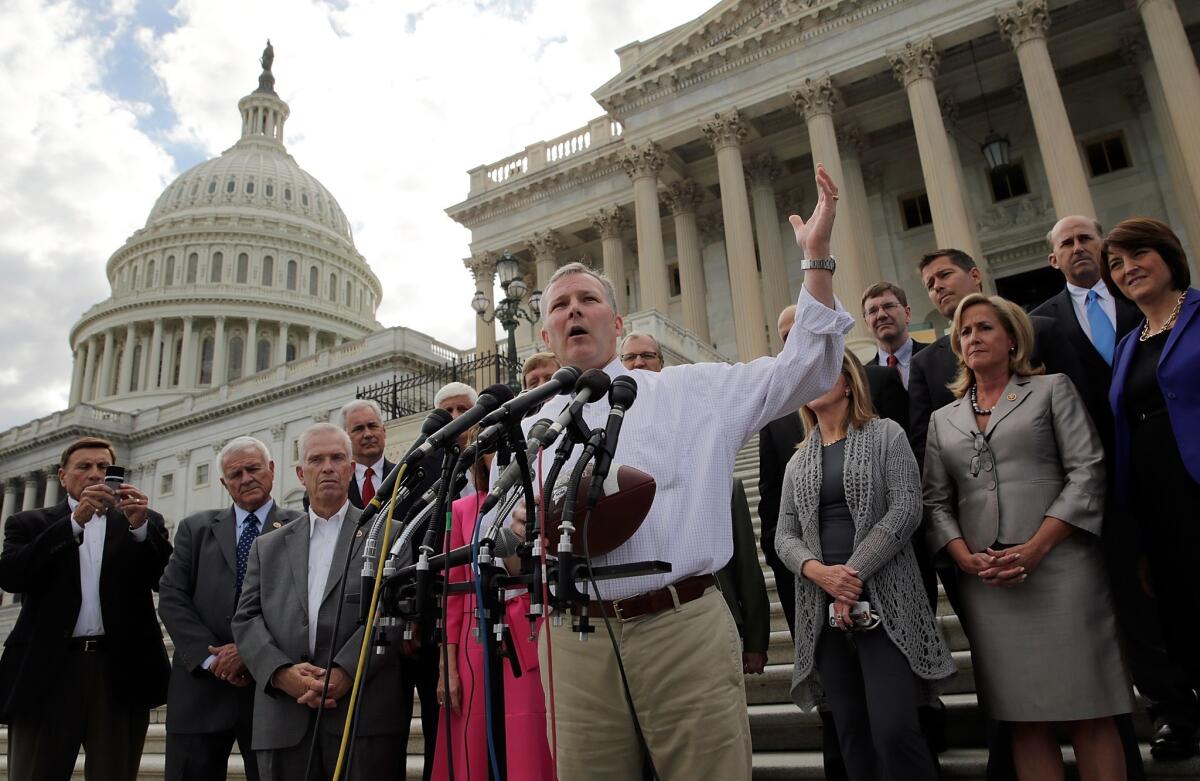Pingpong over Obamacare, government shutdown continues

House Republicans took to the airwaves Sunday to blast the Senate in general and Majority Leader Harry Reid (D-Nev.) in particular for taking the day off as a partial government shutdown loomed.
This is a bit like me holding my neighborâs baby over the edge of my balcony, then rebuking my neighbor for not paying enough attention to her childâs safety. Nevertheless, the Republicans have an interesting point. Given that the House GOP has chosen to negotiate with Senate Democrats by playing legislative pingpong, passing versions of the stopgap funding bills back and forth in search of one thatâs mutually acceptable, shouldnât the Senate stay at the table until the game is over?
The answer is no, but not because the Senate shouldnât negotiate. Itâs because neither chamber can expect to dictate to the other how the game will be played.
Itâs worth noting whatâs really going on here. Republicans donât have the votes to repeal the 2010 Patient Protection and Affordable Care Act (better known as Obamacare). Their best hopes had been to have the law thrown out by the courts (which failed when the Supreme Court ruled it constitutional in 2012) or to gain the power to change the law by taking control of the Senate or the White House in the 2010 and 2012 elections (which they didnât). That leaves them trying to extract concessions on the law by threatening not to pass other measures that Democrats badly want to pass.
Hence the threats to shut down federal agencies by letting their funding run out Monday, or to stiff federal creditors and beneficiaries by not letting the government borrow more money when it hits the debt limit next month.
While itâs exceptionally bad policy to play chicken with the debt ceiling, it seems more legitimate for the GOP to threaten not to fund the government if the Affordable Care Act isnât changed. For Republicans who really believe that Obamacare is ruinously bad policy, it makes sense to do everything they can to try to stop that from happening.
But they need to take responsibility for what theyâre doing. If the government shuts down, it wonât be because the Senate took Sunday off. It will be because Senate Democrats werenât willing to give in to the GOPâs demands on Obamacare, even if it meant the governmentâs running out of discretionary funding at midnight Monday, forcing about 40% of the federal workforce to stay home and the other 60% to work with their paychecks deferred. (Hereâs a good summary of what the effects would be on the public. Hereâs another, courtesy of the Washington Post.)
The critical question in any negotiation is how committed each side is to its position. Thatâs why tough disputes, such as the ones in Congress over fiscal issues and Obamacare, donât get decided until bad stuff is about to happen, or it actually starts happening. Witness the last several negotiations over spending levels, taxes and the debt ceiling.
Both sides appear committed enough to their positions that they wonât agree on a stopgap funding bill by the end of Monday. The Senate wasted little time that day removing the House amendments to the Senate-passed continuing resolution on a party-line vote; at this writing, House GOP leaders were expected to propose yet another set of changes to the healthcare law, possibly dealing with the mandate on insurers to provide contraceptive care with no copays or the federal governmentâs contribution to congressional employeesâ healthcare costs.
By keeping the Senate out on Sunday, Reid cut off at least one round of the back-and-forth. The result may be one less chance for House Republicans to try to force vulnerable Senate Democrats to make a politically sensitive vote, but from Reidâs perspective, thatâs the point. Itâs all posturing by the House GOP; that chamber has yet to pass anything that could be viewed as a reasonable offer.
In fact, the last proposal from the House violated the Senateâs pay-as-you-go rules by seeking to cancel or delay revenue-generating provisions of the Affordable Care Act without including offsets to avoid increasing the deficit.
Part of the process is trying either to saddle the other side with the blame for the aforementioned bad stuff, or to convince the public that what might happen isnât actually bad. Hence the finger-pointing by House Republicans, who recognize that itâs hard to sugarcoat even a partial government shutdown. Keeping federal agencies funded, after all, is a core responsibility of the legislative branch.
The bad news for Republicans is that the public seems to have a clear notion of whom to blame, and that would be the side that picked this fight. Avik Roy, a sharp critic of the Affordable Care Act, cited a new tracking poll Monday that shows only a third of those polled want to stop the healthcare law -- despite widespread public skepticism about its benefits.
âWith a government shutdown looming, only 33% of voters say Congress should delay, defund or repeal the healthcare law and 51% of voters say they will blame Republicans in Congress âa lotâ if the government shuts down, compared with 41% for President Obama and 36% for Democrats in Congress,â the report by The Morning Consult states.
At any rate, the pingpong game continued Monday with no end in sight -- just a deadline for avoiding the consequences.
ALSO:
Sharing the Road: Can L.A. be a cyclistâs town?
The suicide magnet that is the Golden Gate Bridge
Follow Jon Healey on Twitter @jcahealey and Google+
More to Read
A cure for the common opinion
Get thought-provoking perspectives with our weekly newsletter.
You may occasionally receive promotional content from the Los Angeles Times.











